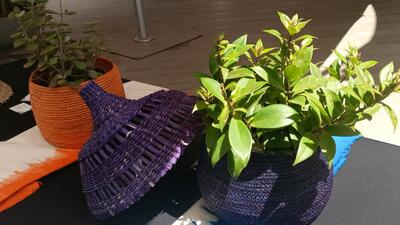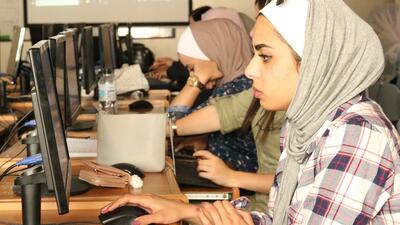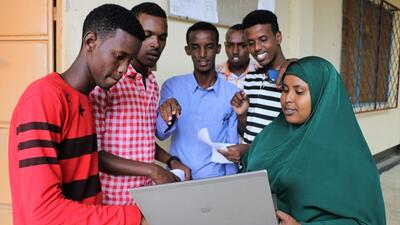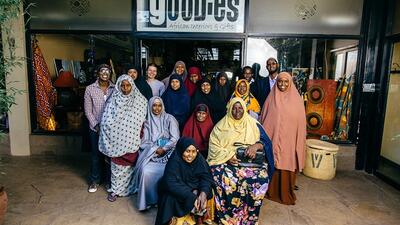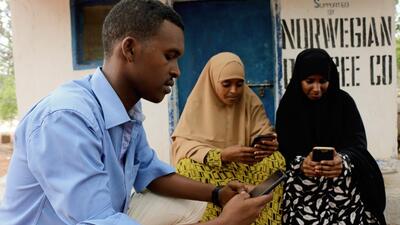
Story: Leading to S.P.A.C.E.: In conversation for World Refugee Day 2021
Displaced communities were among the most affected by the COVID-19 outbreak in 2020, showing the need to build resilience among these vulnerable groups.
But how do we do this?
On 19 June, to mark World Refugee Day, the International Trade Centre together with actors from the private sector discussed just that challenge, focusing on how to foster greater private-sector engagement in displacement settings.
A holistic and agile approach would allow the private sector to find a viable business model to impact displaced populations and host communities.
Pamela Coke-Hamilton, Executive Director of the International Trade Centre, opened the conversation:
“Ensuring that displacement-affected communities are connected to private-sector actors for increased market linkages and trade is key in our work. But with our experience we have also learned that the challenges and risks are significant for the private sector when operating in a disrupted market setting that has a high level of uncertainty.”
Why should the private sector engage in displacement settings?
Isaac Kwaku Fokuo Jr is the Head of the African-led initiative Amahoro Coalition in Kenya. The Coalition engages the private sector in access to education and economic opportunities for refugees, while creating value for African businesses and society at large.
“We advise on how companies can use conversations as a driver for the Sustainable Development Goals, seize market opportunities, and synthetize them to create a strategy around it. I don’t want corporate social responsibility. I don’t want your foundation to just give money. I want you to see areas and opportunities as a business, while having an impact.”
Building on the need for structures, Sawadogo Maïga W. Fatouma, representative of the Groupement d’Intérêt Economique dénommé CABES in Burkina Faso, explained how CABES connects nearly 2,000 artisans, including Tuareg refugees, returnees and displaced persons, to international fashion and lifestyle buyers.
“We are in contact with both the artisans and the companies. Thanks to this connection, the buyers’ needs are directly transmitted to the artisans to allow them to get the product right.”
Finding the right market
Katie Hyson, Director of Thought Leadership at Business Fights Poverty, talked with two social enterprise founders.
Ifrah Mohamed Arab is the founder and CEO of SuperMom, a social enterprise that turns women from marginalized communities into a sales force of fast-moving consumer goods within their communities, hence closing the distribution gap, or the ‘last mile’.
“I opened my mind to how other people are given equal opportunities, both men and women, and I wanted to go home and change this narrative. But here’s the thing. You don’t wake up one day and change a culture that has been there for thousands of years.”
One day, Ifrah learned that while she had the opportunity to buy things five minutes from where she lives, others in her county, Garissa in Kenya, had to travel long distances to buy good in bulks every month.
“Why not use this problem to push for women’s empowerment? This is how SuperMom was born.”
Ifrah identified women in the villages and matched them with manufacturing companies. As the information gap also exists among the host community, she involved them, including the elderly and religious leaders.
Noora Sharrab is the co-founder and CEO of Sitti, a social enterprise that empowers refugee women in the Jerash Camp by selling olive oil soap.
Noora co-founded Sitti when she visited the camp for work. Having large stocks of olive oil soap, but no market access, numerous women in the camp approached Nora, which led to an organic process of discovering this potential business case.
“When you create things out of a refugee camp, there is also this thing called a pity purchase. People will think, I will buy it because I feel bad. But I was like, no you’re going to buy it because it’s the best soap there is.”
We need empowerment and economics, not empathy.
Chantale Zuzi and Abshir Habseme, two young refugees, expressed their empowerment through poetry. The 19-year-old Chantale is a motivational speaker and women’s rights advocate from the Democratic Republic of the Congo, and Abshir Habseme is a fellow from Narratio, a global platform that supports creativity.
From the many remarks that the event brought forth, Ashish Shah, Director of Country Programmes at the International Trade Centre, used the acronym S.P.A.C.E. to reflect on the event’s highlights:
S for support. The private sector should not enter displacement settings on their own.
P for perseverance. Work hard to enter markets.
A for adaptation. It is vital to understand local contexts.
C for co-creation. Build your business model together with the beneficiary group in mind.
E for enabling environment. For entrepreneurship and especially economics, not for empathy.
View the recording of the event here.




